Since the early days of Middle Temple, the Masters of the Bench, or Benchers, have been at the helm of the Inn, overseeing decisions on a variety of administrative, educational and business matters. While these functions continue today, the role of Benchers has evolved over time. This month, we highlight the changing responsibilities of the Inn’s governors, along with the historical privileges and occasional burdens associated with this esteemed status.
The early development of the role was inseparable from the Inn’s tradition of Reading, the educational recitation and discussion of a particular statute. At that time, only those who had read became ‘complete’ Benchers and were entitled to a say in Parliament. The Minutes of Parliament from 11 February 1572/3 record that a Peter Rosse, came up to the Bench ‘without a voice as Readers have’ due to his not having read. This was further illustrated in a subsequent Parliament in 1640, when the Benchers ordered fine for students’ absence in reading, noting that the Inn’s previous governors were specially employed ‘in holding together in commons the company of this Fellowship in their public hall.’ Reading, or upholding the tradition of it, was therefore considered the primary duty of Benchers.

The Inn’s present-day ‘Bench Table’ in Hall, now commonly referred to the High Table
The onerous burden of Readership led to the rise of a subsidiary category of Benchers for senior Called members who had not, or did not intend to, read, known as Associates of the Bench. They enjoyed the privileges and dignity of Benchers – such as sitting at the Bench Table at dinners – but did not have a voice in the Inn’s governance. A notable example was Henry Montagu, 1st Earl of Manchester, who was Called as such upon becoming Recorder of London in 1603, before being elected Reader in 1606. However, the title of Associate Bencher did not survive long after the practice of reading in Hall fell by the wayside in the late 17th century. By then Benchers could fulfil this obligation simply by paying what was called the Reading money, rendering the distinction between the two categories redundant.
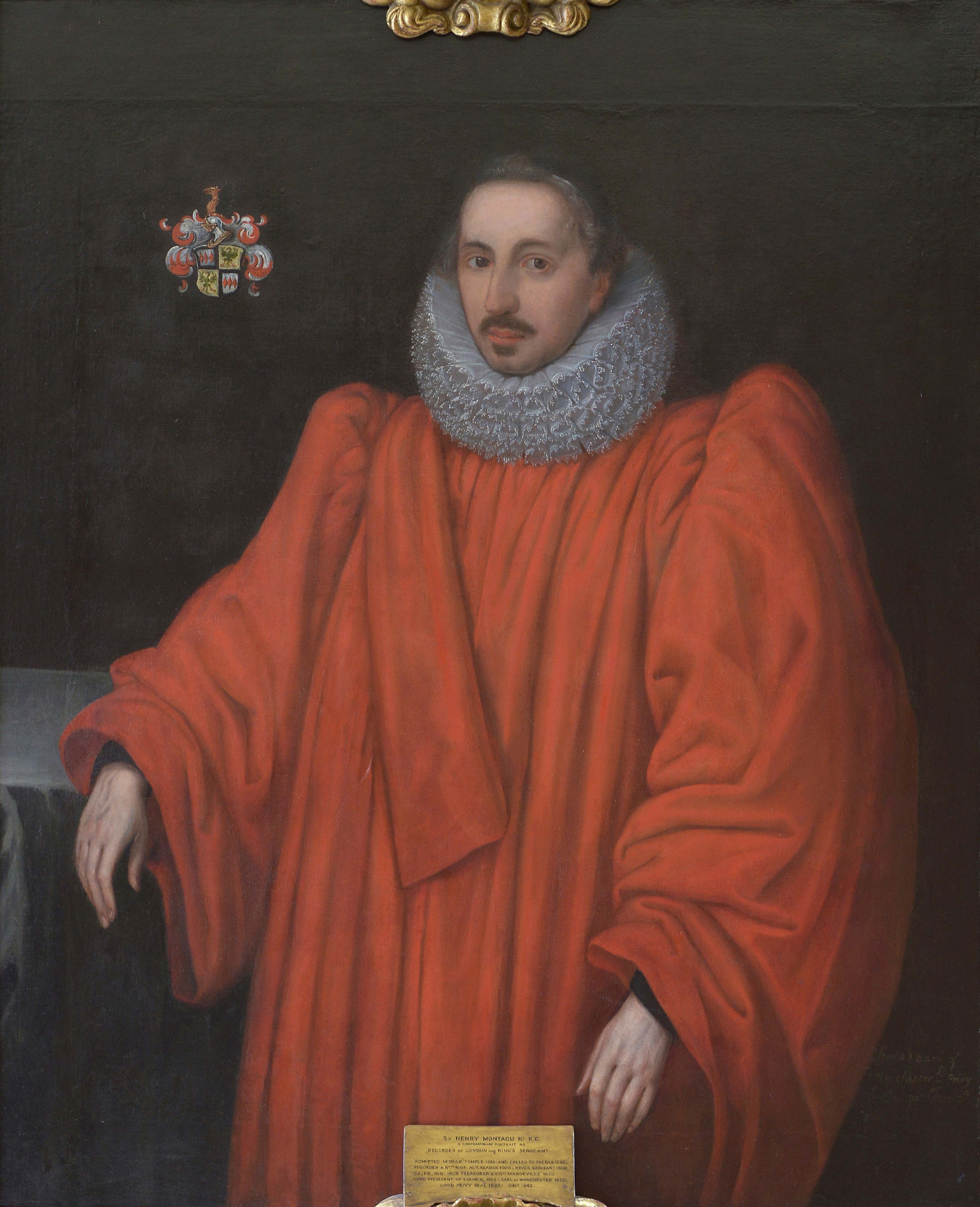
Portrait of Henry Montagu, 1st Earl of Manchester, c. 1600–1650
While the burden of reading could now be dealt with financially, attending meetings of Parliament remained Benchers’ core responsibility. Parliament in those days was not very different from today, encompassing acts such as formulating orders, discussing and voting on motions, deliberating on letters and petitions, confirming student admission and proposing them for Call to the Bar. Outside Parliament, Benchers also took the lead in the education of students, such as presiding over mooting and other learning exercises.
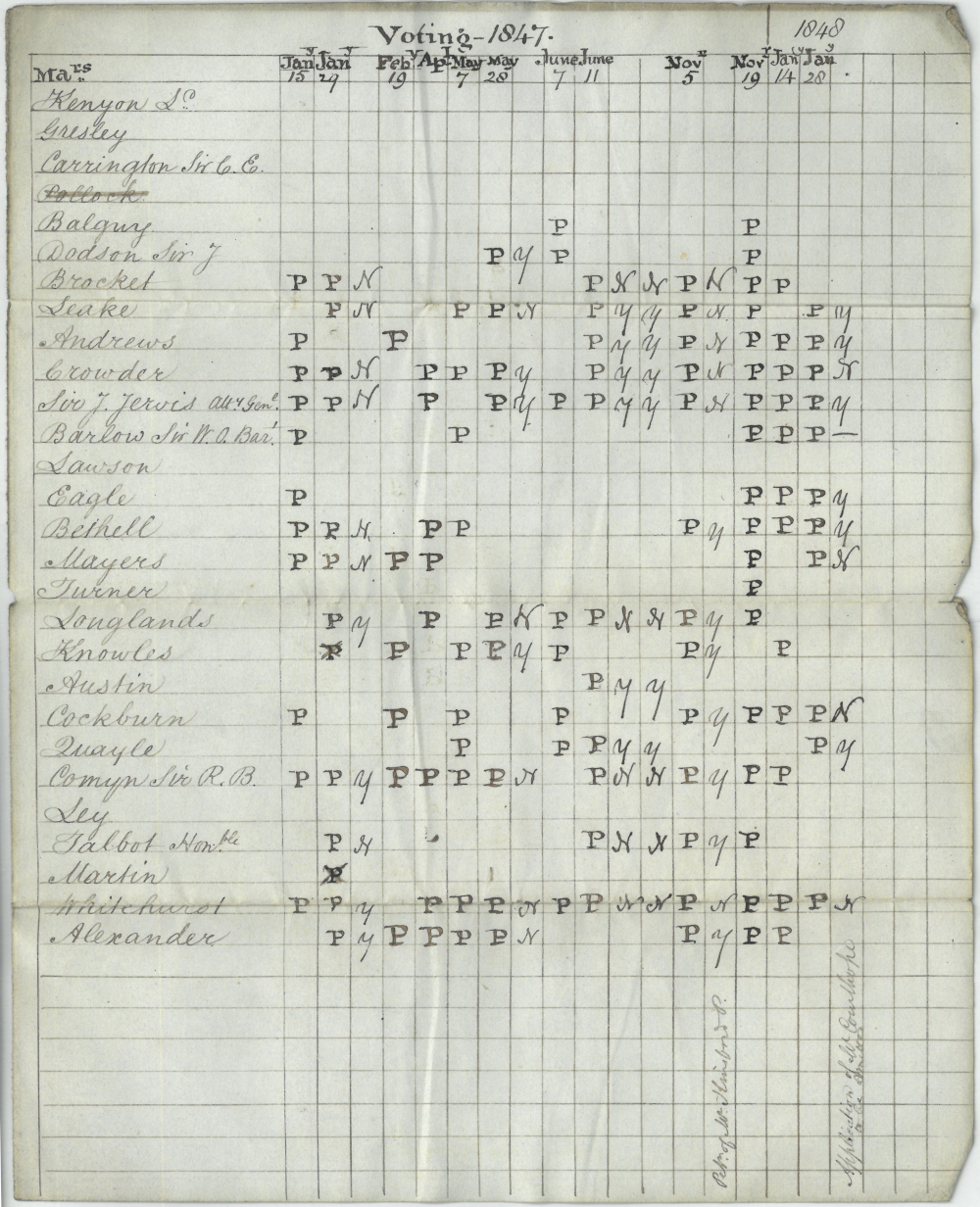
Voting summary of meetings of Parliament, recording attendance of Benchers and their votes on motions, 1847–48 (MT/21/1/6)
Another part of a Bencher’s role was the requirement, much like that of students, to keep terms by dining in Hall. An order passed in February 1689/90, for example, stipulated that Benchers were to attend Commons one whole week or two half weeks every term in Hall. Similar orders followed in the next two centuries, suggesting that Benchers’ attendance at dinners was not always satisfactory. In 1860 ten Benchers responded to this with a sense of humour, pledging to pay the Treasurer the sum of £10,000 if they fail to dine in Hall at least once in every term. In a subsequent letter by the son of one of the signatories, Master John Greenwood, the bond was described to have been ‘drawn up by way of a joke’, as one might expect.
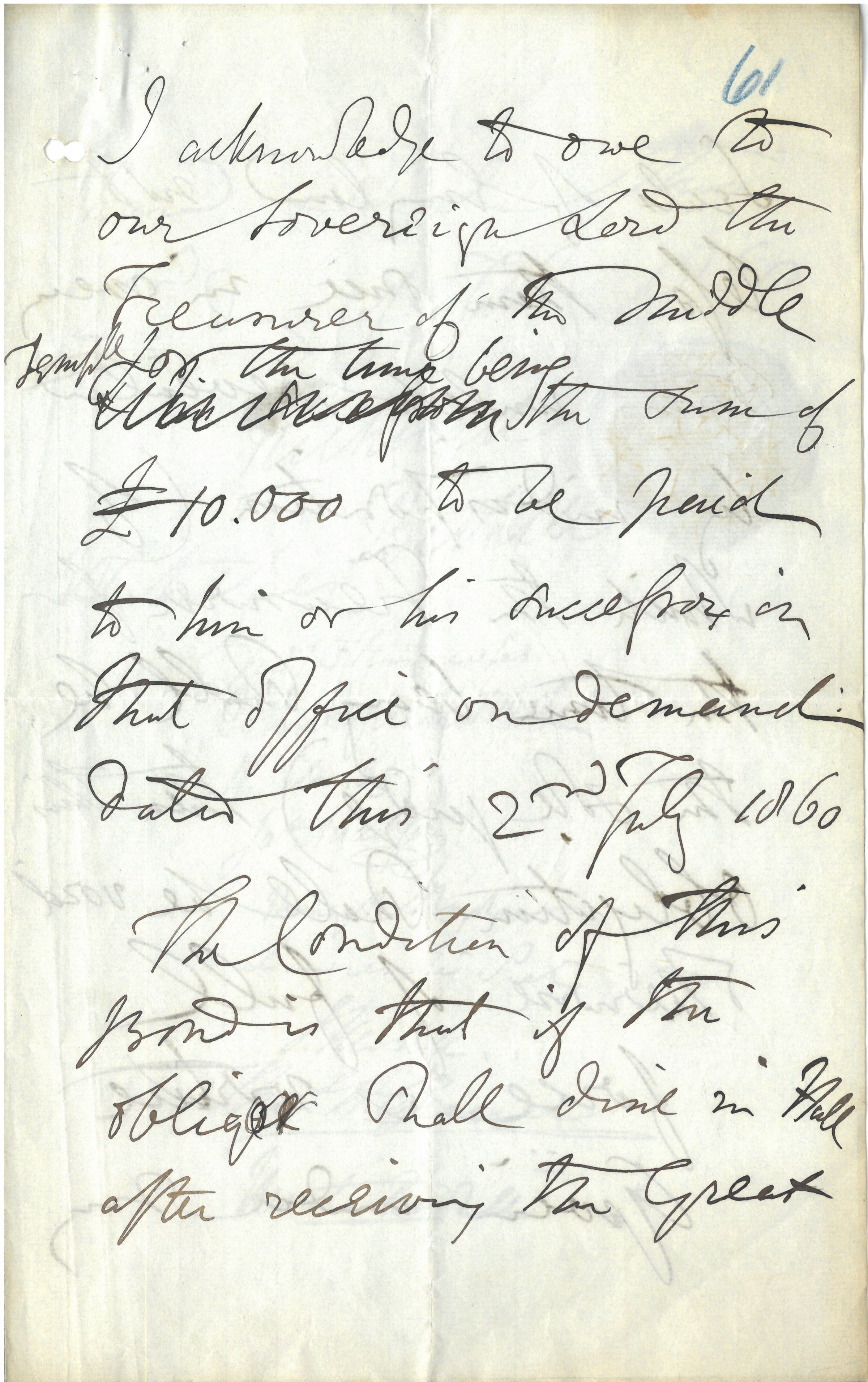
Extract of a bond signed by Benchers regarding attendance at Hall dinners, 1860 (MT/3/BEM/43)
The commitment of Benchers was rewarded with significant benefits. For nearly three centuries, the Inn designated chambers for which Benchers, upon paying their Call fee and Reading money, enjoyed a life ownership. Prior to the abolition of this rule in 1870, Benchers would choose their preferred chambers in order of their seniority and had the flexibility of either occupying or renting them out, providing a valuable source of income.
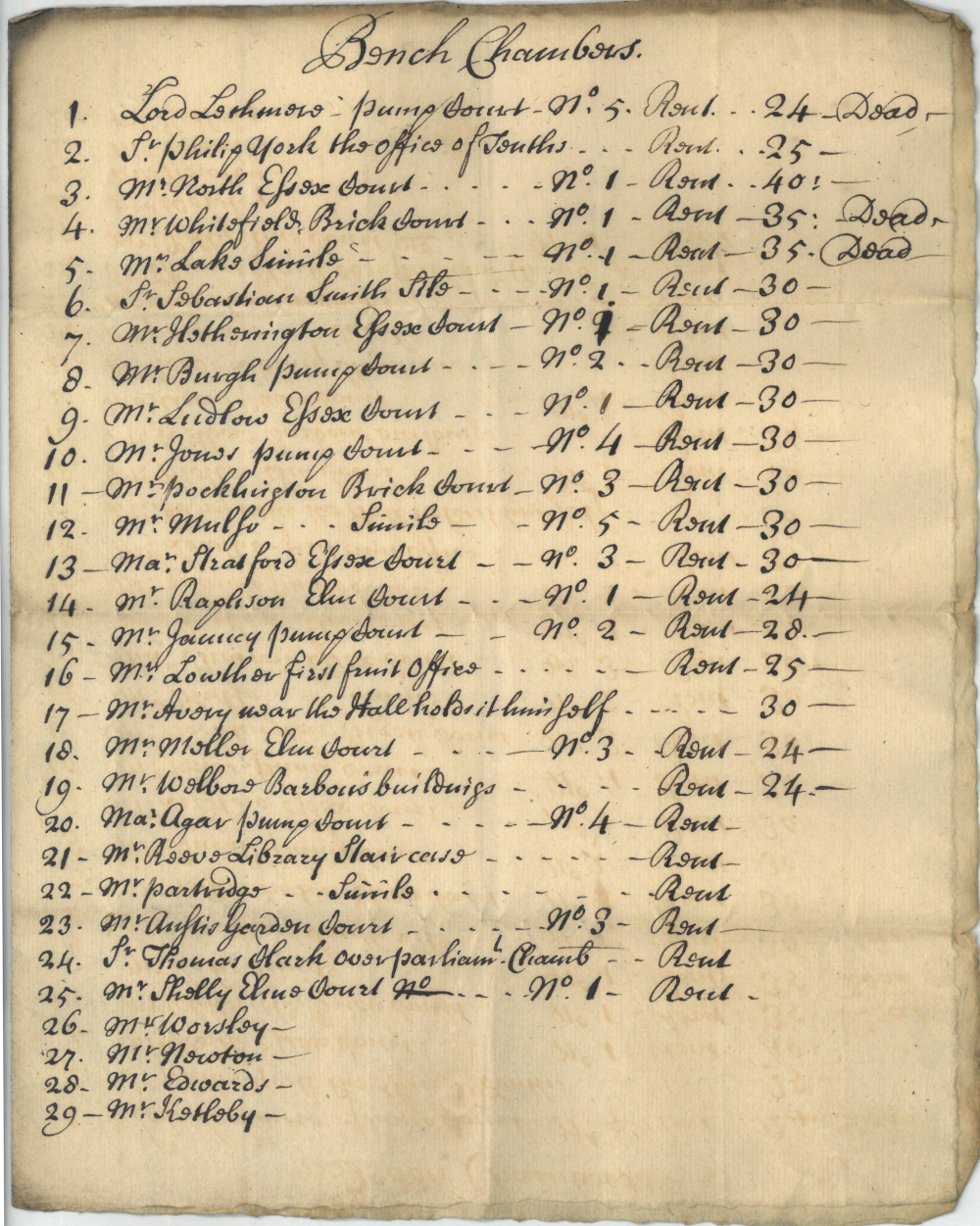
List of Benchers with Bench Chambers and a record of the rent charged, 1725 (MT/21/1/46)
Another (now-abolished) perk of being Called to the Bench benefitted not the Benchers themselves but their sons. In the 18th century, Benchers’ sons could be admitted to the Inn with admission fee waived and the requirement of keeping terms exempted, and, like many graduates from Oxford and Cambridge, were usually Called to the Bar ‘ex gratia’ (by favour). An interesting coincidence occurred in 1750, when John Hatsell and Thomas B. Bramston were Called to the Bar in this manner on the same day by their fathers, Masters Henry Hatsell and Thomas Bramston, respectively. The two young men would follow their fathers’ footsteps to become Benchers, Readers and eventually Treasurers of the Inn.
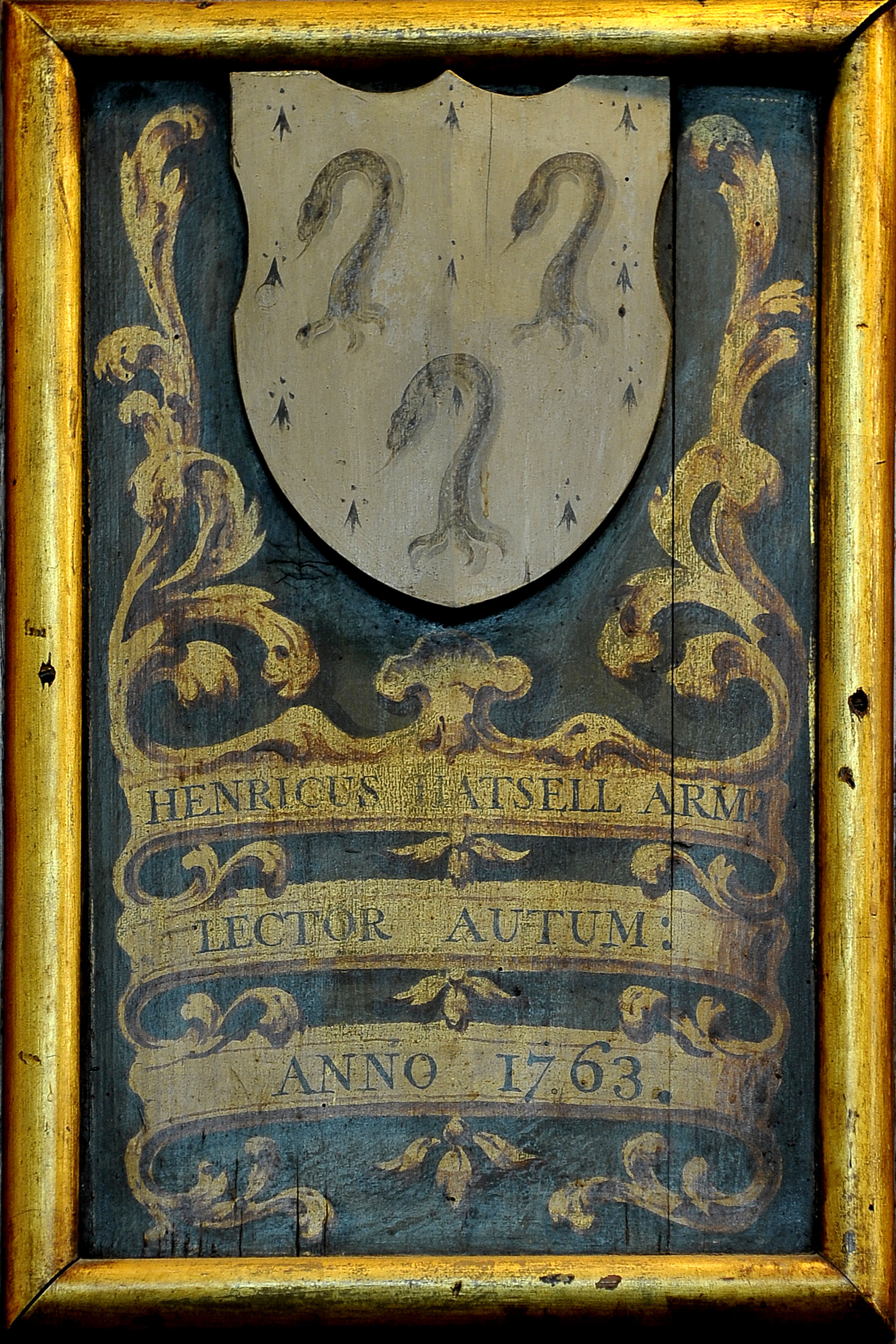
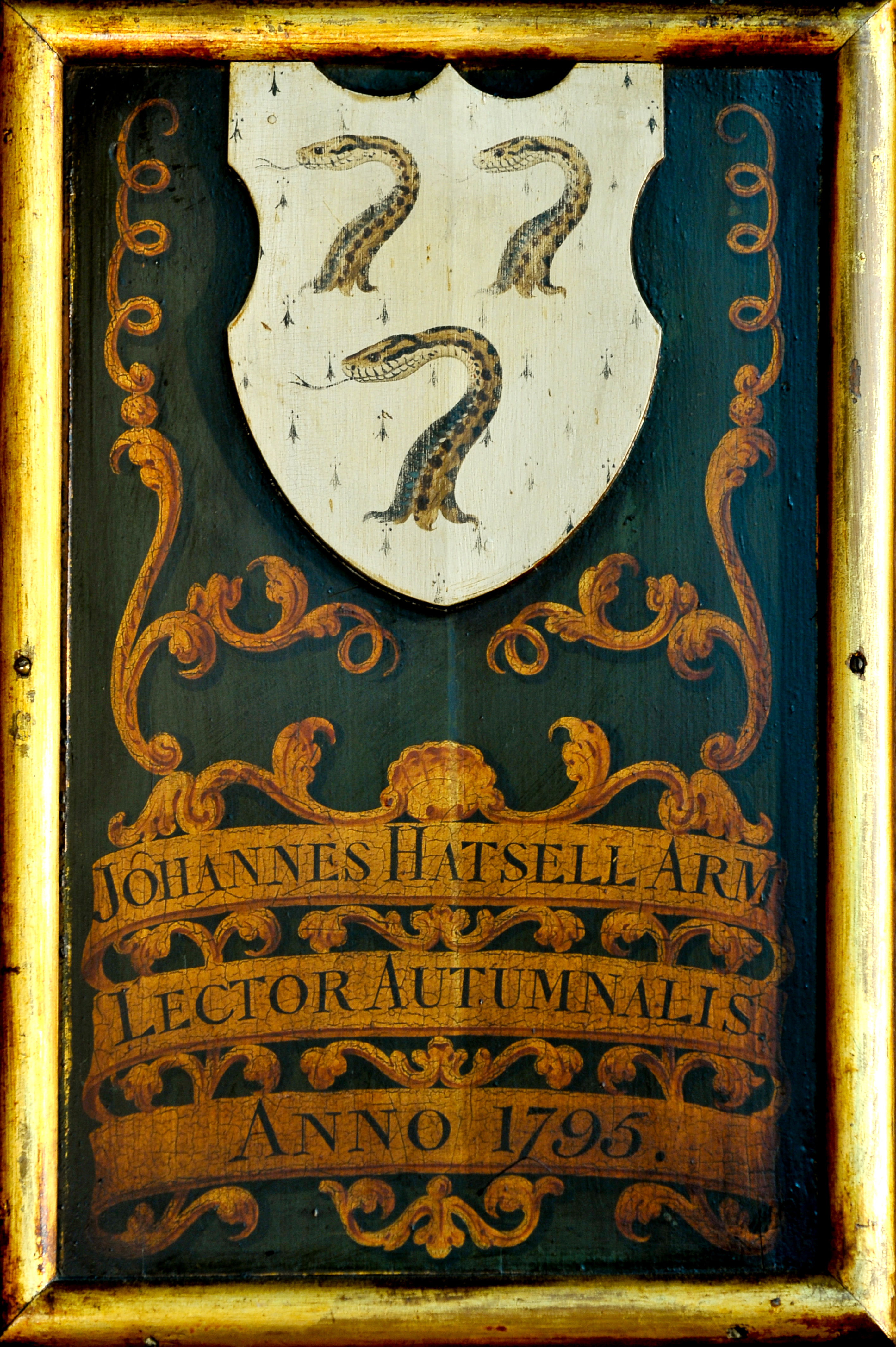
Armorial panels of Masters Henry and John Hatsells, depicting the same coat of arms featuring three vipers’ heads
The wide range of responsibilities encompassed by being a Bencher meant it required substantial expertise and dedication to do the job. In the early centuries of the Inn’s existence, this position was only open to members with 15 years of standing, unless they were a King’s or Queen’s Counsel. It was not until 1862 that the number of years of standing was reduced to 10, allowing more aspiring members to be considered by Parliament.
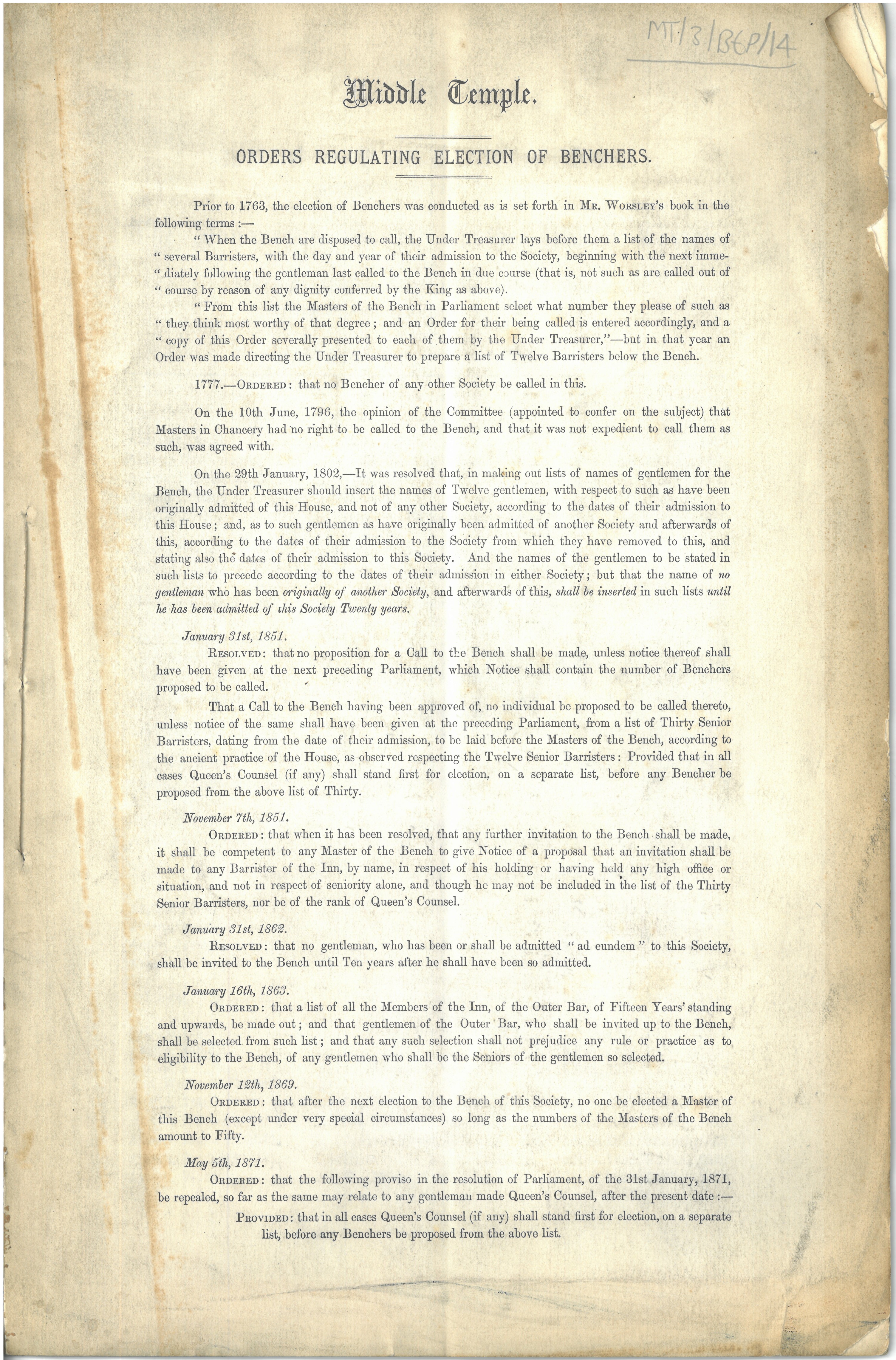
Printed orders of Parliament regarding election of Benchers, attached to a list of barristers of fifteen years’ standing, c. 1870 (MT/3/BEP/14)
One major development regarding Masters of the Bench in the 18th century was the increasingly codified process of invitation and selection. At this time, when a place at the Bench became available, a list of eligible senior barristers, arranged in the order of admission date, would be drawn up for Parliament’s consideration. Invitation to join the Bench would then be sent by rotation, until a sufficient number of members accepted to fill the vacancy.
An invitation letter would outline the fees for Call, Reading, and Bench chambers, while also illustrating the Inn’s rich traditions of hospitality – upon acceptance the new Bencher must ‘treat the Bench with three dozen of Claret, and each mess below the Bench with a couple of bottles of Port’. Many recipients would indeed decline the offer – for reasons such as old age, ill health or other existing commitment. A William Beard, an invitee in 1784, declined simply because of the sheer distance to travel from his residence in Newcastle to London.
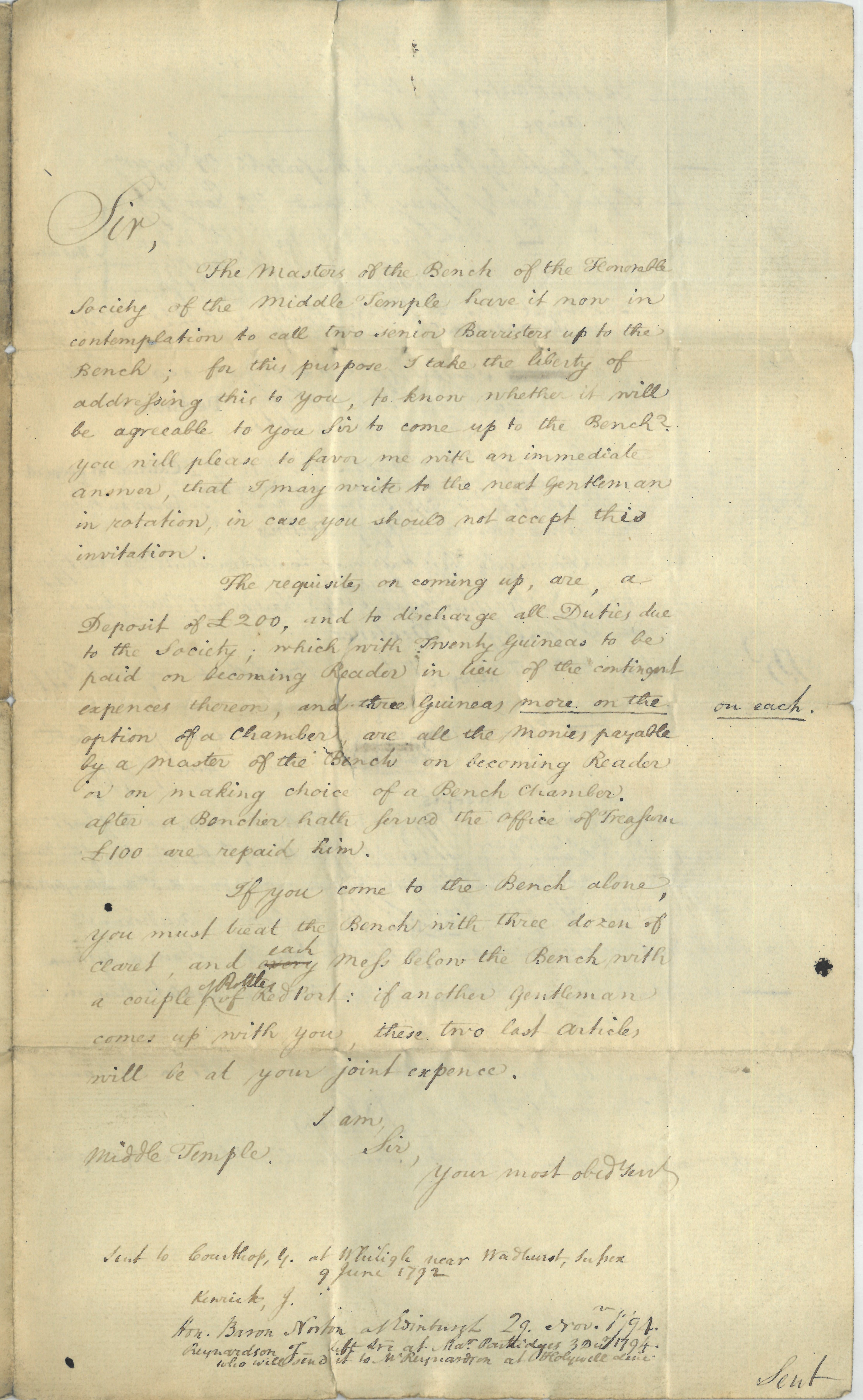
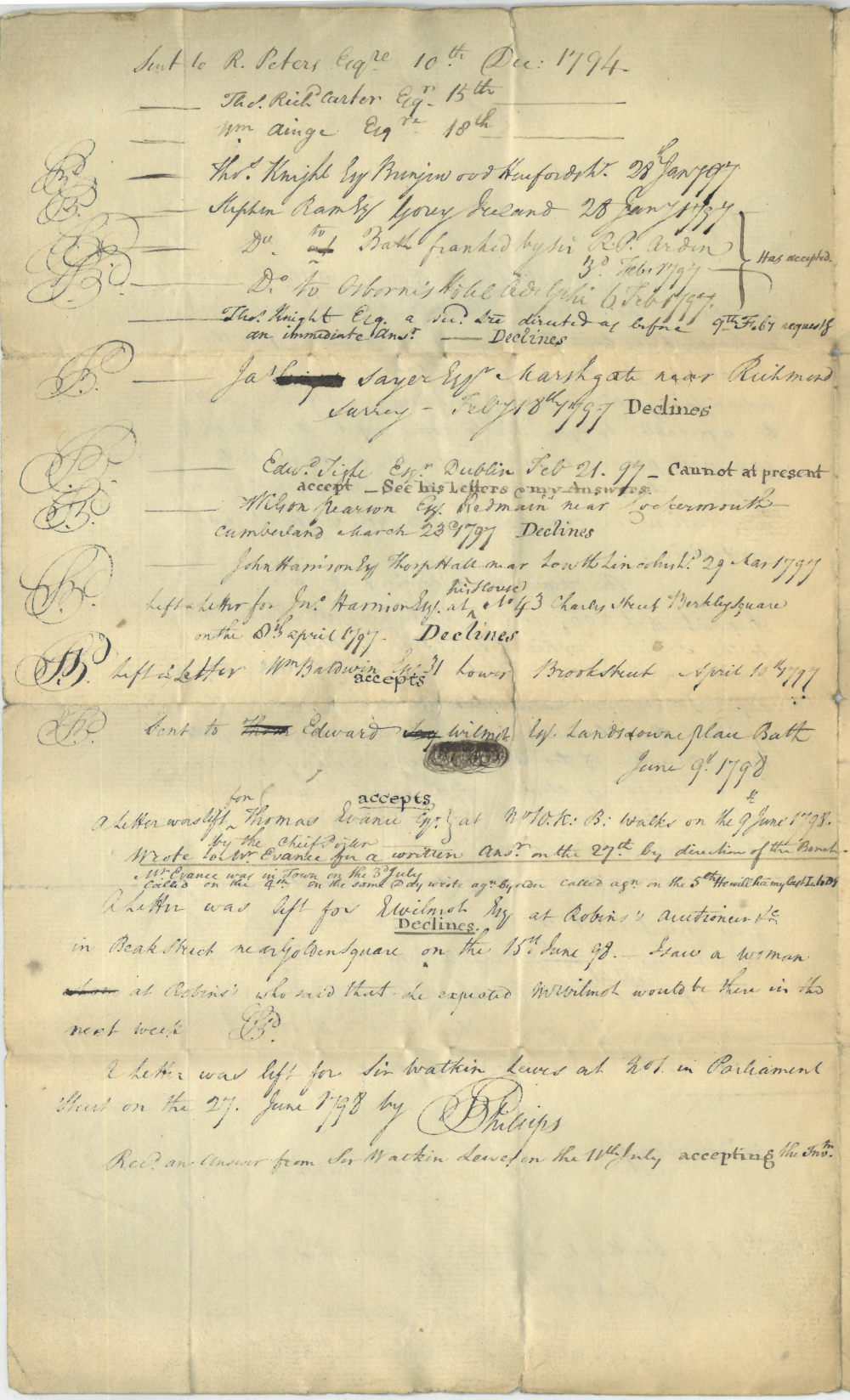
A template letter of invitation to Call to the Bench, with notes at the back indicating responses from individual members, 1794 (MT/3/BEP/19)
Like the Inn’s membership, Mastership of the Bench was, and still is, a lifelong commitment, unless an individual was removed through disbenchment. Disbenchment, though uncommon, was not unheard of. As early as in 1614, a Master Robert Smyth, having been Called to the Bench for four years, was disbenched for ‘publicly and maliciously ... abused Mr Thomas Richardson, Reader of Lincoln's Inn, and other Benchers with many scornful speeches’. In the centuries that followed, several more Benchers would lose their place for refusing Readership upon being chosen.
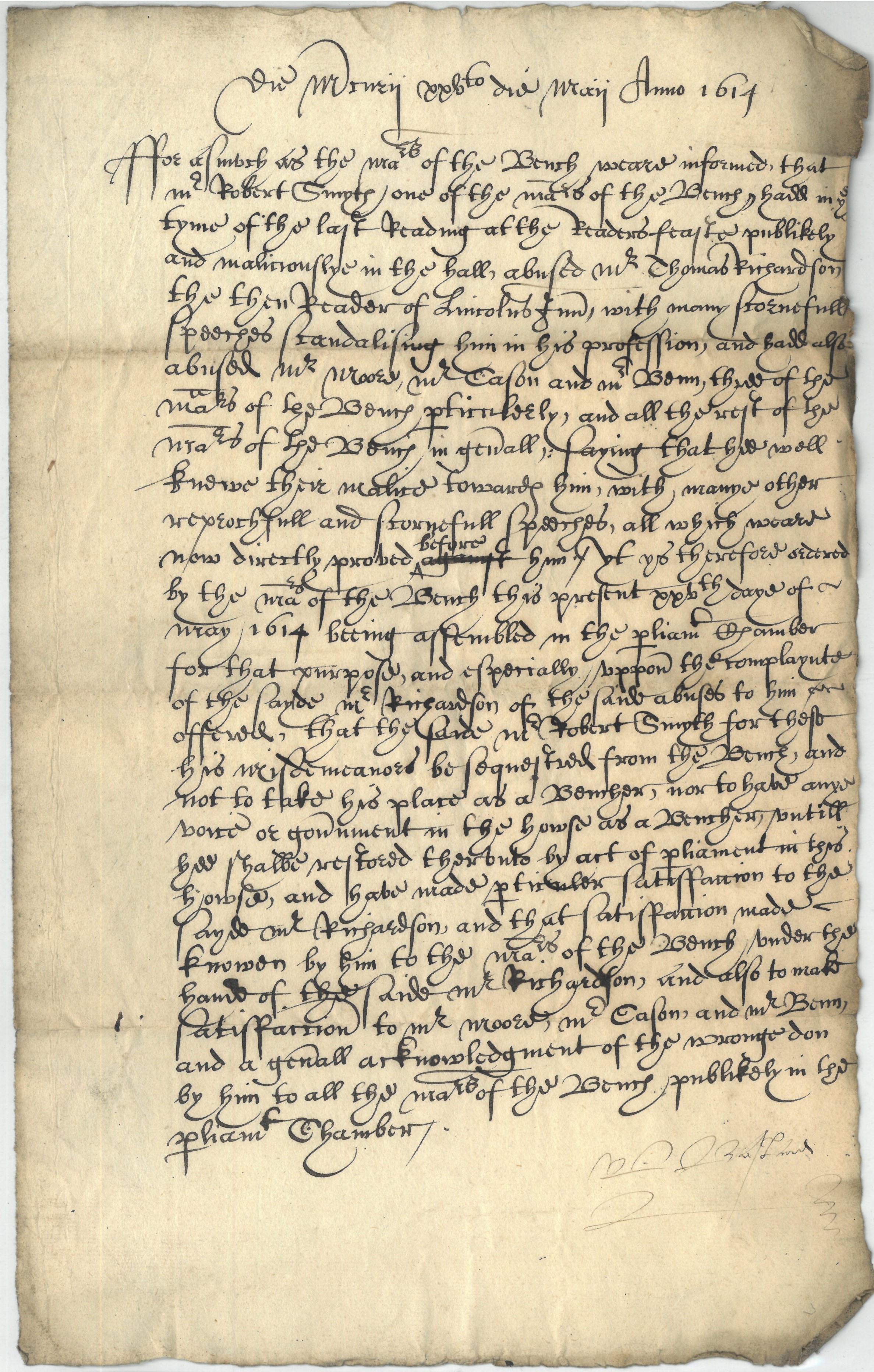
An account of Master Robert Smyth’s abusive behaviour during the time of his reading at the Reader’s Feast, 1614 (MT/21/1/122)
A rare case of resignation was recorded in 1929, by Master Henry Terrell, who, having retired as a County Court Judge, doubted if he ‘shall ever be able to attend another dinner or Parliament’. Considering Master Terrell had already defended himself at a special meeting summoned by the Bench earlier for his prolonged absence at dinners and meetings of Parliament, his resignation might not have been entirely unexpected. The Bench accepted his resignation, yet ordered him to settle his overdue duties.
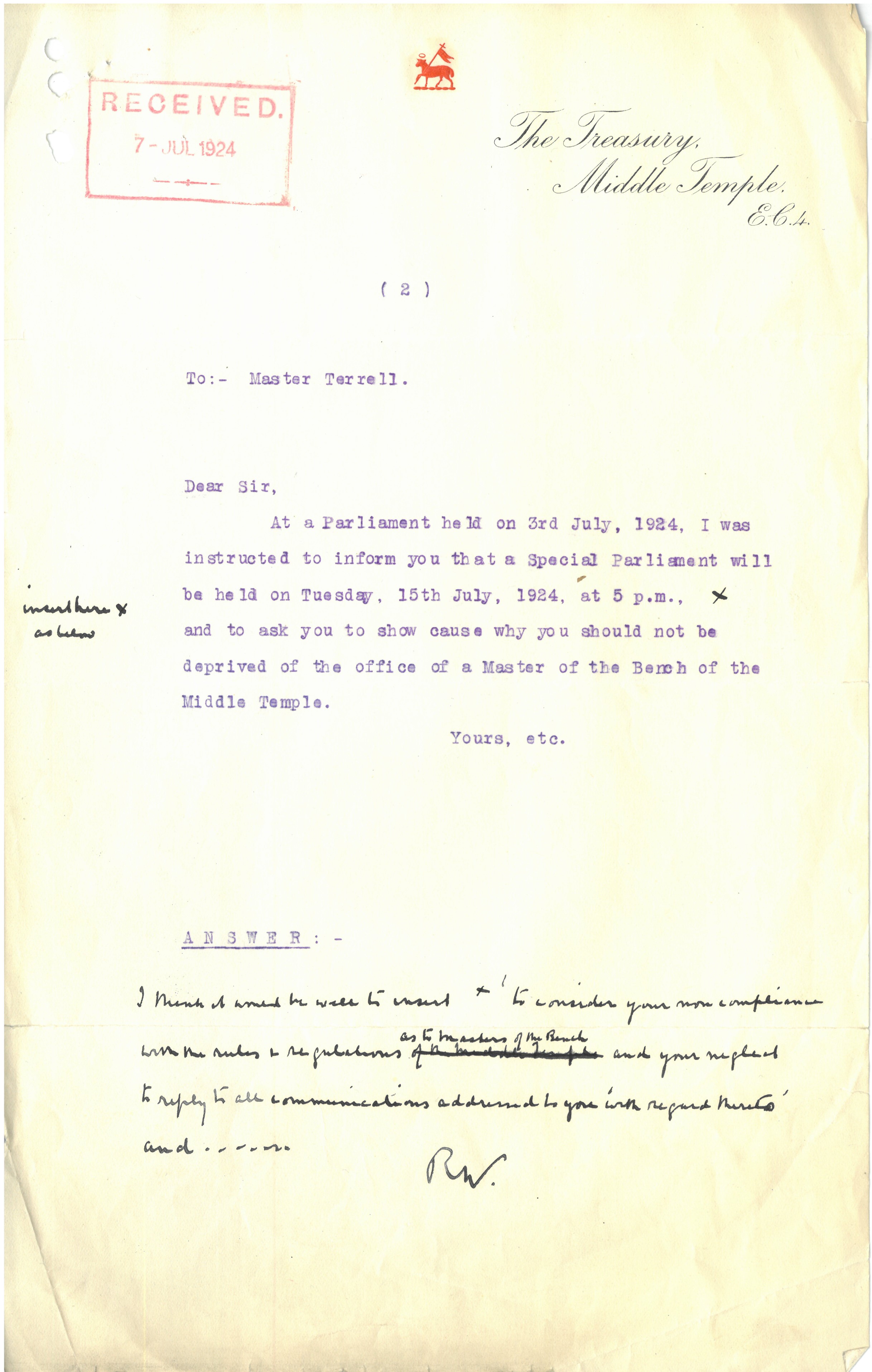
Parliament’s notice to Master Henry Terrell of a Special Parliament discussing his non-compliance with the rules as to the Masters of the Bench, 1924 (MT/3/BEM/9)
Given the multiple responsibilities attached to the role, a 'nominal’ category of Bencher emerged in the 18th century to accommodate those unable to devote time to the Inn’s affairs, much like the aforementioned title of Associate Bencher. This was a precedent set by Sir John Cust in 1763, a Middle Templar who led a successful political career. Perhaps owing to his engagement as Speaker of the House of Commons, Sir John Cust chose to be considered only as an honorary member, not liable to be elected as Reader or Treasurer.
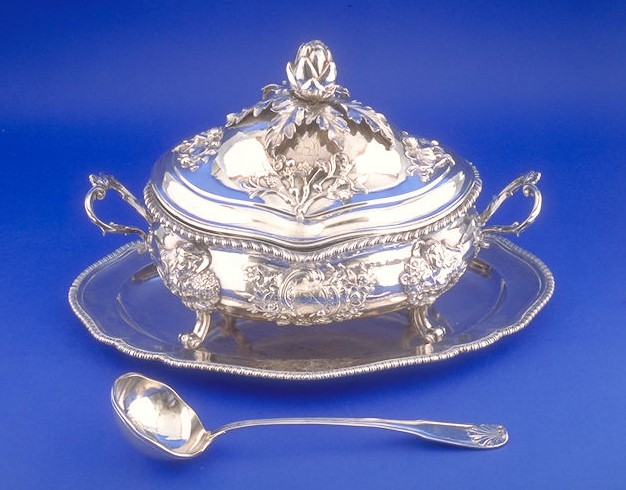
A Rococo-style silver soup tureen donated by Sir John Cust upon his Call to the Bench
The title of Honorary Bencher fell into disuse in the 19th century, but during this time the Inn forged stronger relationships with the Royal Family, ultimately leading to the creation of a new category of Masters of the Bench. In 1861, HRH Albert, Prince of Wales, later King Edward VII, became the Inn’s first Royal Bencher and since then five more members from the Royal Family have been Called to the Bench.
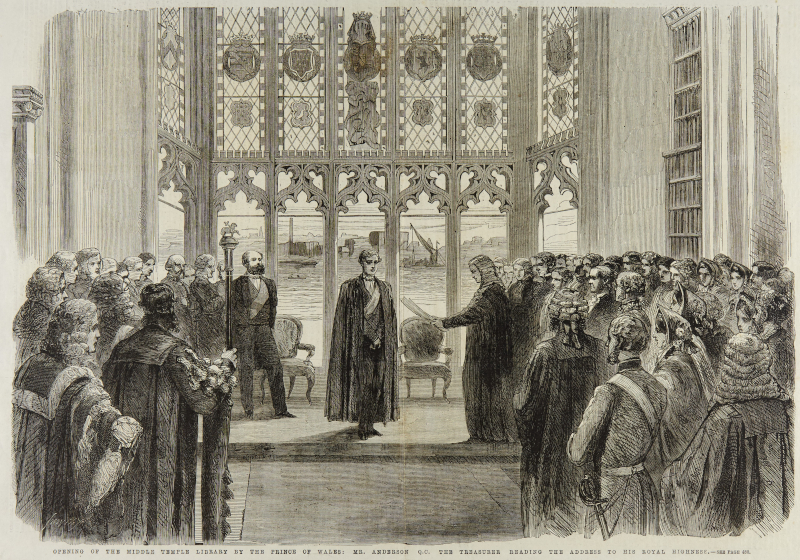
Print of Albert, Prince of Wales opening the Inn’s Library, an occasion coinciding with his Call to the Bench, 1861 (MT/19/ILL/D/D6/4)
The practice of Calling Honorary Benchers resumed at the turn of the 20th century, and has proven ever since to be a valuable way for the Inn to celebrate and build its connections with senior Benchers, distinguished legal figures and individuals who have excelled beyond the legal realm. The first non-member Called to the Bench was Lord Robertson, in 1900, a Scottish judge. He was followed by Master Joseph Choate in 1905, US diplomat and the first foreigner to become an Honorary Bencher, marking the beginning of the Inn’s tradition of conferring US Ambassadors with such an honour. Today, the Inn’s Honorary Benchers reflect the Inn’s connections across a myriad of fields and around the globe.
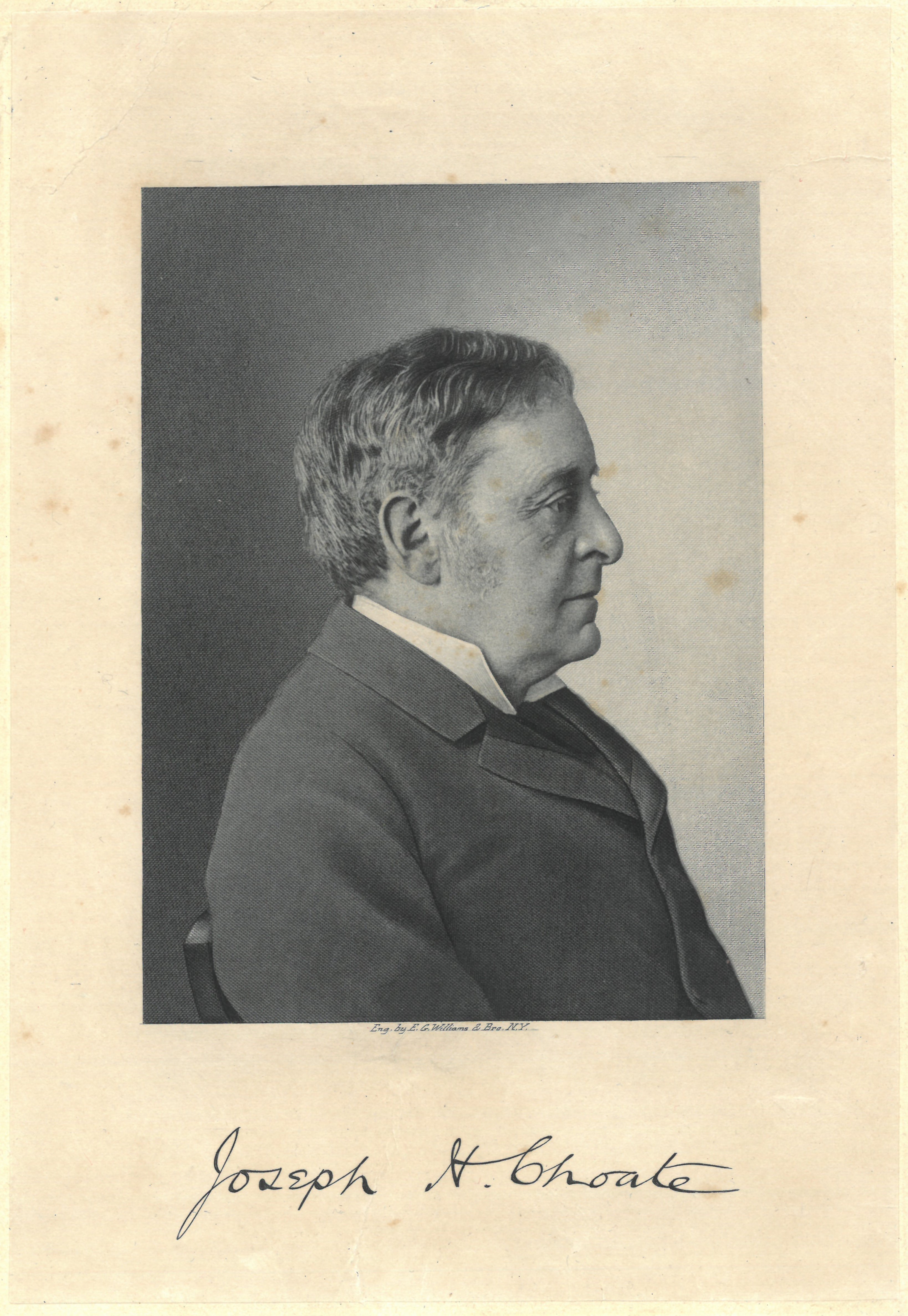
Portrait engraving of Master Joseph Choate (MT/19/POR/138)
The 20th century saw the first women Called to the Bar at the Inn, in 1922. Queen Elizabeth (later the Queen Mother) was Called as a Royal Bencher in 1944 and the US Ambassador Anne Armstrong as an Honorary Bencher in 1976, but it was not until 1979 that Master Margaret Booth was Called as the first female Ordinary Bencher. The Inn saw our first female Reader, Master Barbara Calvert, deliver her Lent Reading in 2001, and the first female Treasurer, Master Dawn Oliver, served in 2011.
Armorial panel of Master Barbara Calvert, depicting two snowdrops and a single-masted ship
The number of the Inn’s Masters of the Bench now reaches over eight hundred, including five hundred Ordinary Benchers – a tenfold increase from two centuries ago. This expansion has occurred alongside ongoing efforts to review and improve arrangements relating to Benchers’ responsibilities, eligibility, nomination, selection and many other aspects, led by the Inn’s Bench Selection Advisory Committee. More recently, the number of minimum years of standing for Bench Call has been lowered, and the importance of inclusion and diversity is one of the factors that has been given more emphasis, as has the significance of contribution towards the life of the Inn. As evidenced from the above brief history, the Masters of the Bench are a constantly evolving body, reflecting the Inn’s vision and position in its time.